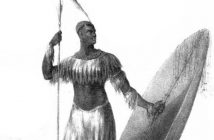
Founder and first paramount ruler of the Basotho nation, Moshoeshoe I was one of the most successful Southern African leaders of the 19th century, and he is revered as the Father of the kingdom which later became known as Lesotho. Born in 1786, near the upper Caledon River in Menkhoaneng, northern Basutoland (north of present-day Lesotho) and given the name Lepoqo, he began to prove his bravery in his youth by organizing daring cattle raids and helping his father Mokhachane, a minor chief of the Bamokoteli lineage from the Koena (Crocodile) clan to dominate smaller clans. Once after a successful cattle raid against Ramonaheng, young Lepoqo composed a poem eulogizing his success. In the panegyric, he described himself as “a razor which has shaved all Ramonaheng’s beard” and the name Moshoeshoe evolved from that. In Sesotho, a razor is said to make a ‘shoe-shoe’ (shwe-shwe) sound. As his profile grew, he developed a relationship with an older chief Mohlomi, a revered wise man which was instructive in his generous treatment of friends and foes alike. By 1820 Moshoeshoe succeeded his father at the age of 34 and led his followers to Butha Buthe Mountain where they first settled, forming his own clan. At about this time, the legendary Shaka Zulu had begun to expand his Zulu kingdom, by raiding smaller clans along the eastern coast of Southern Africa and this ultimately led to a period of wars and unrest, known as Mfecane. Forced to shift base, Moshoeshoe moved to the Qiloane plateau in the western Maloti Mountains and settled there.
As refugees fled the Mfecane, Moshoeshoe absorbed them into his kingdom and the Basotho nation was born. The settlement became an impregnable stronghold and was renamed Thaba Bosiu(Mountain of the Night). It was believed that the mountain shrunk in the day, but expanded at night. Moshoeshoe made a smart move in 1833 by welcoming the Paris Evangelical Mission Society, and used them to establish good diplomatic relationships with British politicians in Cape Town. However, by 1848 the British had annexed the Orange River Sovereignty (later Orange Free State) and the threat of a direct Anglo-Boer led to two wars which the Basotho won. At the Bloemfontein Convention of 1854,the Orange Free State became an independent Boer nation, since the British did not want to continue losing face against the Sotho. Border disputes continued with the Boers and Moshoeshoe continued to gain the upper hand, until 1864 when the Boers eventually united under J.H. Brand. In 1868, faced with impending defeat and a possible annihilation of his people at the hands of the Boers, Moshoeshoe chose the lesser evil and turned to the British and Basutoland came under British protectorate. The border disputes with the Boers was resolved at the Treaty of Aliwal the following year, and King Moshoeshoe died the year after.

King Moshoeshoe or Moshesh of the Basotho people of Lesotho. Photo from the Nineteenth Century.
It would take until 1966 before Basutoland became independent and was renamed Lesotho, but the people are grateful to the great king who is regarded as the Father of the Nation. The 11th of March is a national holiday marked as Moshoeshoe Day to commemorate the anniversary of his passage.
Moshoeshoe was born in 1786 and named Lepoqo. He was known as Letlama which was his post circumcision name. Thaba Bosiu is located in Maseru District and it is just 24km from the city of Maseru. Moshoeshoe reigned around the same period as the legendary Zulu King Shaka and Mzilikazi of the Ndebele whom he had disputes with. He was only 34 years old when he established his clan and settled in Butha Buthe. In 1852, after defeating the British for the second time in two years, Moshoeshoe sent an appeal to the British commander, showing himself a wise king through diplomacy. Moshoeshoe I International Airport is named in his honor.






